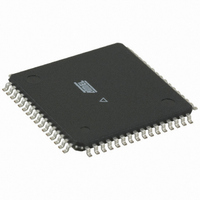ATMEGA169-16AI SL710 Atmel, ATMEGA169-16AI SL710 Datasheet - Page 273

ATMEGA169-16AI SL710
Manufacturer Part Number
ATMEGA169-16AI SL710
Description
IC AVR MCU 16K 16MHZ IND 64TQFP
Manufacturer
Atmel
Series
AVR® ATmegar
Specifications of ATMEGA169-16AI SL710
Core Processor
AVR
Core Size
8-Bit
Speed
16MHz
Connectivity
SPI, UART/USART, USI
Peripherals
Brown-out Detect/Reset, LCD, POR, PWM, WDT
Number Of I /o
54
Program Memory Size
16KB (8K x 16)
Program Memory Type
FLASH
Eeprom Size
512 x 8
Ram Size
1K x 8
Voltage - Supply (vcc/vdd)
2.7 V ~ 5.5 V
Data Converters
A/D 8x10b
Oscillator Type
Internal
Operating Temperature
-40°C ~ 85°C
Package / Case
64-TQFP, 64-VQFP
For Use With
ATAVRBFLY - KIT EVALUATION AVR BUTTERFLYATSTK502 - MOD EXPANSION AVR STARTER 500
Lead Free Status / RoHS Status
Contains lead / RoHS non-compliant
Other names
ATMEGA16916ASL710
- Current page: 273 of 365
- Download datasheet (4Mb)
Parallel Programming
Enter Programming Mode
Considerations for Efficient
Programming
Chip Erase
Programming the Flash
2514P–AVR–07/06
The following algorithm puts the device in parallel programming mode:
1. Apply 4.5 - 5.5V between V
2. Set RESET to “0” and toggle XTAL1 at least six times.
3. Set the Prog_enable pins listed in Table 124 on page 271 to “0000” and wait at
4. Apply 11.5 - 12.5V to RESET. Any activity on Prog_enable pins within 100 ns
5. Wait at least 50 µs before sending a new command.
The loaded command and address are retained in the device during programming. For
efficient programming, the following should be considered.
•
•
•
The Chip Erase will erase the Flash and EEPROM
bits are not reset until the program memory has been completely erased. The Fuse bits
are not changed. A Chip Erase must be performed before the Flash and/or EEPROM
are reprogrammed.
Note:
Load Command “Chip Erase”
1. Set XA1, XA0 to “10”. This enables command loading.
2. Set BS1 to “0”.
3. Set DATA to “1000 0000”. This is the command for Chip Erase.
4. Give XTAL1 a positive pulse. This loads the command.
5. Give WR a negative pulse. This starts the Chip Erase. RDY/BSY goes low.
6. Wait until RDY/BSY goes high before loading a new command.
The Flash is organized in pages, see Table 121 on page 269. When programming the
Flash, the program data is latched into a page buffer. This allows one page of program
data to be programmed simultaneously. The following procedure describes how to pro-
gram the entire Flash memory:
A. Load Command “Write Flash”
1. Set XA1, XA0 to “10”. This enables command loading.
2. Set BS1 to “0”.
3. Set DATA to “0001 0000”. This is the command for Write Flash.
4. Give XTAL1 a positive pulse. This loads the command.
B. Load Address Low byte
least 100 ns.
after +12V has been applied to RESET, will cause the device to fail entering pro-
gramming mode.
The command needs only be loaded once when writing or reading multiple memory
locations.
Skip writing the data value 0xFF, that is the contents of the entire EEPROM (unless
the EESAVE Fuse is programmed) and Flash after a Chip Erase.
Address high byte needs only be loaded before programming or reading a new 256
word window in Flash or 256 byte EEPROM. This consideration also applies to
Signature bytes reading.
1. The EEPRPOM memory is preserved during Chip Erase if the EESAVE Fuse is
programmed.
CC
and GND.
(1)
memories plus Lock bits. The Lock
ATmega169/V
273
Related parts for ATMEGA169-16AI SL710
Image
Part Number
Description
Manufacturer
Datasheet
Request
R

Part Number:
Description:
IC AVR MCU 16K 16MHZ IND TQFP
Manufacturer:
Atmel
Datasheet:

Part Number:
Description:
IC AVR MCU 16K 16MHZ IND 64-QFN
Manufacturer:
Atmel
Datasheet:

Part Number:
Description:
IC AVR MCU 16K 16MHZ 5V 64TQFP
Manufacturer:
Atmel
Datasheet:

Part Number:
Description:
IC AVR MCU 16K 16MHZ 5V 64-QFN
Manufacturer:
Atmel
Datasheet:

Part Number:
Description:
IC AVR MCU 16K 16MHZ IND 64QFN
Manufacturer:
Atmel
Datasheet:

Part Number:
Description:
IC AVR MCU 16K 16MHZ IND 64TQFP
Manufacturer:
Atmel
Datasheet:

Part Number:
Description:
IC AVR MCU 16K 16MHZ IND 64-QFN
Manufacturer:
Atmel
Datasheet:

Part Number:
Description:
8-bit Microcontroller with 16K Bytes In-System Programmable Flash
Manufacturer:
ATMEL [ATMEL Corporation]
Datasheet:

Part Number:
Description:
Atmega169 8-bit With 16k Bytes Of In-system Programmable Flash
Manufacturer:
ATMEL Corporation
Datasheet:

Part Number:
Description:
DEV KIT FOR AVR/AVR32
Manufacturer:
Atmel
Datasheet:

Part Number:
Description:
INTERVAL AND WIPE/WASH WIPER CONTROL IC WITH DELAY
Manufacturer:
ATMEL Corporation
Datasheet:

Part Number:
Description:
Low-Voltage Voice-Switched IC for Hands-Free Operation
Manufacturer:
ATMEL Corporation
Datasheet:

Part Number:
Description:
MONOLITHIC INTEGRATED FEATUREPHONE CIRCUIT
Manufacturer:
ATMEL Corporation
Datasheet:

Part Number:
Description:
AM-FM Receiver IC U4255BM-M
Manufacturer:
ATMEL Corporation
Datasheet:










